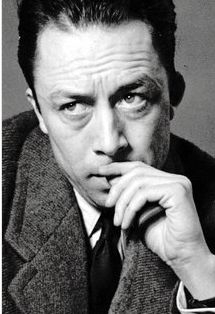L'Étranger
Book Details
| Title: | L'Étranger | ||||||||||
| Author: |
| ||||||||||
| Published: | 1957 | ||||||||||
| Publisher: | Gallimard | ||||||||||
| Language: | French | ||||||||||
| Tags: | fiction, film/TV adaptation | ||||||||||
| Description: | The story of an indifferent French Algerian man who, after attending his mother's funeral, apathetically kills an Arab man whom he knows. The two-part story is his first-person narrative view before and after the murder. L’histoire d’un homme franco-algérien indifférent qui, après avoir assisté à l’enterrement de sa mère, tue dans un état apathique un Arabe qu’il connaît. Ce roman en deux parties, écrit à la première personne, restitue le paysage mental de l’assassin avant et après le meurtre. [Suggest a different description.] |
||||||||||
| Downloads: | 13,273 | ||||||||||
| Pages: | 90  |
Author Bio for Camus, Albert

Albert Camus (7 November, 1913—4 January 1960) was a French-Algerian author, journalist, and playwright best known for his absurdist works The Stranger (1942) and The Plague (1947). He won the Nobel Prize for Literature in 1957 at the age of 43, the second youngest recipient in history.
Born in Mondavi, French Algeria, Camus did well in school and was admitted to the University of Algiers where he studied philosophy and played goalie for the soccer team. He quit the team following a bout of tuberculosis in 1930, thereafter focusing on academic study. By 1936, he had obtained undergraduate and graduate degrees in philosophy. He became political during his student years, joining first the Communist Party and then the Algerian People's Party. As a champion of individual rights, he opposed French colonization and argued for the empowerment of Algerians in politics and labor. Camus would later be associated with the French anarchist movement. He was one of the few Allied journalists to condemn the American use of the atomic bomb in Hiroshima. He was also an outspoken critic of communist theory, eventually leading to a rift with Sartre whom he had met during the war when he joined the French Resistance movement.
The dominant philosophical contribution of Camus's work is absurdism. While he is often associated with existentialism, he rejected the label, expressing surprise that he would be viewed as a philosophical ally of Sartre. Elements of absurdism and existentialism are present in Camus's most celebrated writing. The Myth of Sisyphus (1942) elucidates his theory of the absurd most directly. The protagonists of The Stranger (1942) and The Plague (1947) must also confront the absurdity of social and cultural orthodoxies, with dire results. In Caligula, a play, a Roman Emperor pursues an absurd logic.
As an Algerian, Camus brought a fresh, outsider perspective to French literature of the period—related to but distinct from the metropolitan literature of Paris. In addition to novels, he wrote and adapted plays, and was active in the theater during the 1940s and '50s. His later literary works include The Fall (1956) and Exile and the Kingdom (1957).
He died in Burgundy, France in a car crash with his publisher on January 4, 1960.—Excerpts from biography.com
Available Formats
| FILE TYPE | LINK | ||
| UTF-8 text | 20150715.txt | ||
| HTML | 20150715.html | ||
| Epub | 20150715.epub | If you cannot open a .mobi file on your mobile device, please use .epub with an appropriate eReader. | |
| Epub, specific to Kindle | 20150715-k.epub | ||
| Mobi/Kindle | 20150715.mobi | ![1. Download the .mobi file into your computer’s Downloads Folder.
2. Rename the file from [8-digit number].mobi to [my title].mobi.
3. Connect your Kindle to your computer using the Kindle USB cable.
4. Open the “documents” folder in the Kindle directory and Copy/Paste
the renamed .mobi file into the “documents” folder.
5. Eject your Kindle. The file will then appear in the Kindle Main Menu
as a New item with the new renamed file name. Info](/images/info.jpg) | Not all Kindles or Kindle apps open all .mobi files. |
| PDF (tablet) | 20150715-a5.pdf | ||
| HTML Zip | 20150715-h.zip |
Kindle Direct (New, Experimental)
Send this book direct to your kindle via email. We need your Send-to-Kindle Email address, which can be found by looking in your Kindle device’s Settings page. All kindle email addresses will end in @kindle.com. Note you must add our email server’s address, [email protected], to your Amazon account’s Approved E-mail list. This list may be found on your Amazon account: Your Account→ Manage Your Content and Devices→ Preferences→ Personal Document Settings→ Approved Personal Document E-mail List→ Add a new approved e-mail address.
This book is in the public domain in Canada, and is made available to you DRM-free. You may do whatever you like with this book, but mostly we hope you will read it.
Here at FadedPage and our companion site Distributed Proofreaders Canada, we pride ourselves on producing the best ebooks you can find. Please tell us about any errors you have found in this book, or in the information on this page about this book.
